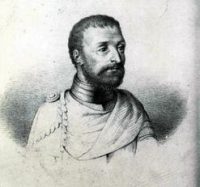[10-11 February: Victoria sails from Timor into the Indian Ocean, called Laut Chidol.]
[7 February: 14- Timor Island- Islands of Cape Verde
Departure on February 7, 1522- Arrival on July 10, 1522. 153-day journey.]
El martes 11 de febrero, en la noche, abandonamos la isla de Timor y entramos en el gran mar, llamado Laut-Chidot. Caminando hacia el oeste sudoeste, dejamos a la derecha, al norte, por temor a los portugueses, la isla de Sumatra, llamada antiguamente Taprobana; Pegu, Bengala, Urizza, Chelim, donde habitan los malayos, subditos del rey de Narsinga; Calicut, que depende del mismo rey; Cambaya, donde habitan los guzerates; Cananor, Goa, Annus, y toda la costa de la India mayor.
En este reino hay seis clases de personas, o castas, a saber, los nairi, panicali, franai, panguelini, macuai y poleai. Los nairi son los principales o jefes; los panicali son los ciudadanos: estas dos castas conversan entre sí; los franai cosechan el vino de palmera y los plátanos; los macuai son pescadores; los panguelinis son marineros: y los poleai siembran y cosechan el maíz. Estos últimos habitan siempre en los campos y no entran jamás en las ciudades. Cuando quieren darles alguna cosa, se la dejan en el suelo, de donde la recogen, y cuando andan por los caminos gritan constantemente po, po, po, esto es, guardaos de mí. Se nos contó que un nairi, que había sido accidentalmente tocado por un poleai, se hizo matar para no sobrevivir a tamaña infamia.
[201] On Tuesday night as it drew near Wednesday, 11 February 1522, we left the island of Timor and took to the great open sea called Laut Chidol, and, laying our course toward the west-south-west, to the north on our right hand, we left the island of Zamatra (formerly called Traprobana) for fear of the king of Portugal; [as well as] Pegu, Bengala, Uriza, Chelin (where the Malabars live, who are subject to the king of Narsingha), Calicut (subject to the same king), Cambaia (where the Guzerati live), Cananor, Goa, Ormuz, and all the rest of the coast of India Major. Six different classes of peo- ple inhabit India Major: Nairi, Panichali, Irauai, Pangelini, Macuai, and Poleai. The Nairi are the chiefs, and the Panichali are the towns- people (those two classes of men consort together); the Irauai gather the palm wine and figs; the Pangelini are the sailors; the Macuai are the fishermen; the Poleai are the farmers and harvest the rice. These last always live in the country, although they enter the city at times, and when anything is given them, it is laid on the ground, and then they take it. When they go through the streets they call out Po! po! po! that is ‘Beware of me!’ It happened, as we were told, that a Nair once had the misfortune to be touched by a Polea, for which the Nair immediately had himself killed so that he would not remain with that disgrace.
Noong gabí ng Martes papalapit nang Miyerkoles, ikalabing-isa ng Pebrero 1522, nilisan namin ang isla ng Timor at nagtúngo sa malaki at malawak na dagat na tinatawag na Laut Chidol. Pagkatapos magtakda ng landas patúngong kanluran timog-kanluran, nilisan namin ang isla ng Zamatra, na dáting tinatawag na Taprobana47, sa hilaga ng kanang kamay namin, dahil sa tákot sa hari ng Portoghala; [kabílang na rin ng] Pegu; Bengala; Uriza; Chelin kung saan nakatirá ang mga Malabar, na siyáng nakapailalim sa hari ng Narsingha; Calicut, na nakapailalim sa parehong hari; Cambaia, kung saan nakatirá ang mga Guzerati; Cananor; Ghoa; Armus; at lahat ng baybáyin ng India Major. Anim na ibá’t ibáng uri ng tao ang nakatirá sa India Major: Nairi, Panichali, Yranai, Pangelini, Macuai, at Poleai. Ang mga Nairi ang mga pinunò; at ang Panichali ang mga taumbayan: magkasámang nag-uusap ang dalawang uring iyon ng tao. Tagatipon ng alak ng palma at mga bunga ang mga Iranai. Mga mandaragat ang mga Pangelini. Mga mangingisda ang mga Macuai. Mga magsasaka ang mga Poleai; silá ang tagaani ng palay. Laging nakatirá sa nayon ang hulí, at hindi silá pumapasok sa alinmang lungsod. Tuwing binibigyan silá ng kahit ano, inilalatag ito sa lupa, at sakâ nilá ito kukunin. Tuwing naglalakad silá sa lansangan, sumisigaw silá ng “Po! po! po!”, ibig sabihin, “Mag-ingat sa akin!” Nangyari dati, ayon sa sinabi sa amin, na isang Nair ang minsang minalas na mahawakan ng isang Poleai, na naging dahilan upang kaagad magpakamatay ang Nair nang sa gayon ay hindi siyá mamuhay dalá-dalá ang kahihiyang iyon.
